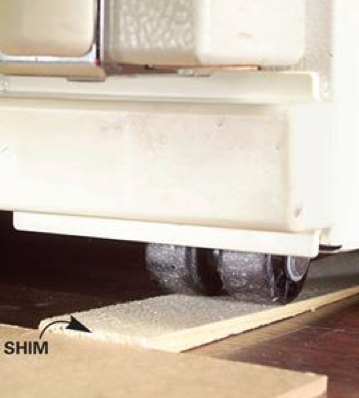Refrigerator Making Noises

On more sophisticated refrigerators there are causes of Nosie ranging from noisy inverter boards, mechanical defrost timers, motor driven baffler systems, auger motors in icemakers etc.. Often these components can be identified through careful observation but in many instances calling a pro may be a better bet.
If you have identified the problem and need parts. Click Here Visit our DIY parts store http://lees.appliancepartsupply.com/index.php
DIY Caution 1 – Avoiding Damage
You could likely pull out your appliance from its home 50 times with a problem but damage can happen very easily if not careful. We have learned that an unplanned sideways skid move or a grain of sand caught under a wheel can scar any floor. We use special Polyethylene mats and Teflon runners to help ensure we move appliances. You should at the very least, lay down a cardboard runway before dragging out your appliance. Better still get a piece of 1/8’ hardboard easily available from Home Depot or Lowes. Use a pair of shims to use as ramps to ease the appliance onto the hardboard placed in front of the appliance. At times you may need two people for large units to safely remove.
DIY Caution 2 – Avoiding Electrical Shock
Electrical Shock is a real danger working on any appliance. Always unplug the appliance when working on the unit especially when replacing parts. You should only diagnose with power applied if you fully understand the system you are working on. Saving a few dollars on a repair will quickly be outweighed by the cost of a hospital visit or worse. If you do not have the knowledge or confidence to do these types of repairs yourself call a Pro.
DIY Caution 3 – Water Damage
Damage caused by water is very real and can be tremendously costly. I have lost count of the number of times we have been approached by homeowners asking us to fix an appliance which had been leaking over a period of a few days, weeks or months unnoticed until floors had started to warp, tiles lift.
Ensure that when you work on any appliance that involves water that you are completely confident that you have not introduced any leaks. Check the entire system on the appliance itself, as well as the water valves or faucets they connect too. Be aware that faucets that are operated after remaining in the open position for years, for example on a washer, and then when closed may not seal properly. If left closed for a number of days leaking slowly you will be faced with a potentially nasty situation Take your time to check for slow water leaks
DIY Caution 4 Gas Leaks
Working with gas is best left to a pro. Risks associated with errors can be catastrophic and deadly. Unless you have experience working with such systems, you are best advised to have a professional perform the work who can ensure that the unit is performing correctly and that no gas leaks exist using manual methods of inspection and electronic detection equipment. Also check that no Carbon Monoxide problems may have been introduced.


